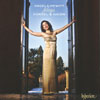Hewitt plays Handel and Haydn
Angela Hewitt identifies the emotional affinity between Handel and Haydn
View record and artist detailsRecord and Artist Details
Composer or Director: George Frideric Handel, Joseph Haydn
Label: Hyperion
Magazine Review Date: 13/2009
Media Format: CD or Download
Media Runtime: 0
Catalogue Number: CDA67736

Tracks:
| Composition | Artist Credit |
|---|---|
| Chaconne |
George Frideric Handel, Composer
Angela Hewitt, Piano George Frideric Handel, Composer |
| (8) Suites for Keyboard, Set I, Movement: Suite No. 2 in F, HWV427 |
George Frideric Handel, Composer
Angela Hewitt, Piano George Frideric Handel, Composer |
| (8) Suites for Keyboard, Set I, Movement: Suite No. 8 in F minor, HWV433 |
George Frideric Handel, Composer
Angela Hewitt, Piano George Frideric Handel, Composer |
| Sonata (un piccolo divertimento: Variations) |
Joseph Haydn, Composer
Angela Hewitt, Piano Joseph Haydn, Composer |
| Sonata for Keyboard No. 62 |
Joseph Haydn, Composer
Angela Hewitt, Piano Joseph Haydn, Composer |
Author: Nalen Anthoni
In her booklet-note she also “unashamedly” admits to sharing with him a relish for an old edition of Handel’s Chaconne that differs from one based on other sources. And she observes the repeat only in the theme, not in the variations. “Authenticists” might be dismayed and might even quail at her introspective rubato in the Suites, two of eight that Handel himself published in 1720 when George I granted him a Privilege of Copyright.
But that’s Hewitt, individual, and equally probing in the deeper waters of Haydn’s Variations where, towards the end, the music reflects a composer whose own faith seems to be sorely tested by personal tragedy. Hewitt is with him in his sobriety, lightness, fury and eventual exhaustion. Regrettably she omits the whimsical five bars – included in the autograph but not in Artaria’s first published version – that bridge the last variation to the return of the theme. Yet all has to be forgiven as Hewitt unfolds the drama of the last sonata through proud gesture and pathos. Rhetoric may be understated but her point of view grows with repetition. The recording never stands in your way.
Discover the world's largest classical music catalogue with Presto Music.

Gramophone Digital Club
- Digital Edition
- Digital Archive
- Reviews Database
- Full website access
From £8.75 / month
Subscribe
Gramophone Full Club
- Print Edition
- Digital Edition
- Digital Archive
- Reviews Database
- Full website access
From £11.00 / month
Subscribe
If you are a library, university or other organisation that would be interested in an institutional subscription to Gramophone please click here for further information.




